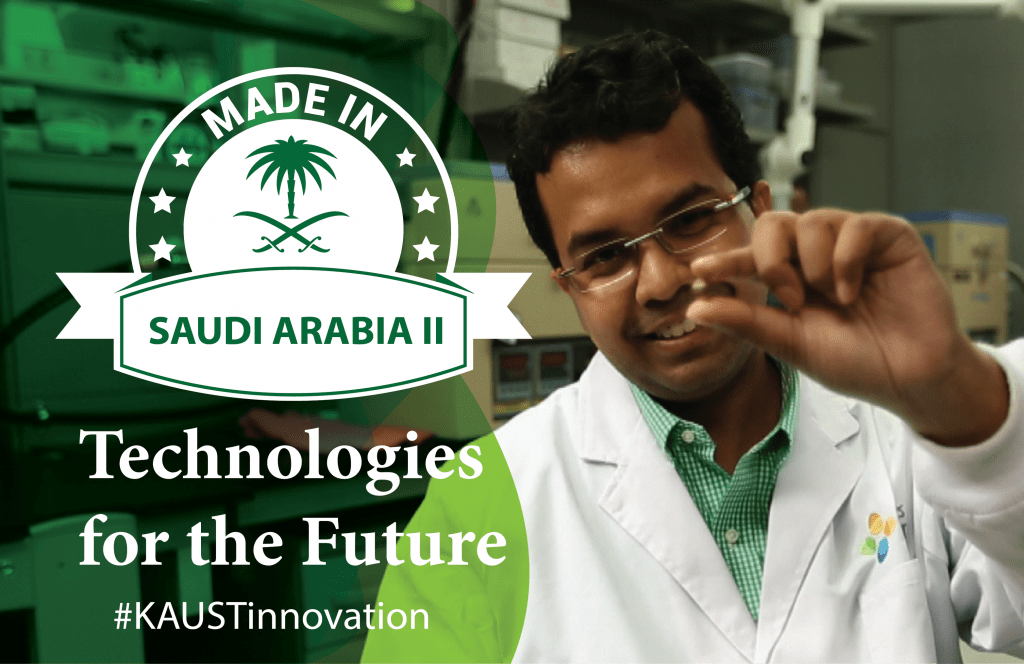Click here to read Part I of this series.
KAUST is helping the Kingdom diversify and become a knowledge-based economy by supporting and growing new technology start-ups and small- and medium-sized enterprises (SMEs).
Vision 2030, released by Saudi Arabia’s Council of Economic and Development Affairs in late April 2016, highlights the importance of SME development to Saudi Arabia’s long-term prosperity.
To encourage growth in this key area, KAUST is developing and investing in Saudi made commercially-ready products and technologies using some of the most sophisticated facilities in the world.
Celebrating and Protecting Innovation
An essential component of research and technology development is to encourage positive risk taking and creativity. To do this, it is important to protect and celebrate innovations and new ideas.
This was highlighted at KAUST’s recent World Intellectual Property (IP) Day Symposium, which was held in late April 2016. The event celebrated the critical role of IP, technology and innovation in Saudi Arabia and the region.
Leaders and IP experts from around the world including Anatole Krattiger from the World Intellectual Property Organization, Thomas Skalak from the Paul G. Allen Family Foundation, Ashley Stevens from Focus IP Group and Peter L. Hoffman from Boeing, discussed the impact of IP and innovation on our societies, economies and lives.
Technology Development at KAUST
KAUST aims to help the Kingdom develop a diversified technology-based economy through its state-of-the-art indoor and outdoor labs and testing stations and ‘innovation cluster’ of strategically connected programs.
For example, KAUST is accelerating its technology commercialization efforts through a Proof-of-Concept (POC) Funding Program. This program allows faculty, students, researchers, entrepreneurs, and partners to initiate POC projects to test and prototype new technologies and innovations for the commercial market without having to raise additional capital to purchase basic and special lab equipment or to find manufacturing space.
KAUST’s Kilo Lab accelerates commercialization and has been commissioned recently to assist with the scaling up of fine chemicals, including pharmaceutical active ingredients and organic-based products. Being the first of its kind in the region, this facility helps industries in their product development, training and other related technical work. It will be pivotal in bringing new technologies to the market and attracting chemical and pharmaceutical companies to test their innovations at KAUST.
KAUST is also helping support early investments in new technology businesses and the transfer of technologies to the market through its own innovation funding programs. These programs are helping to nurture the nascent venture capital scene in Saudi Arabia and the region.
KAUST is a Strategic Partner in the Saudi Arabia Advanced Research Alliance
To advance intellectual property and technology development in the Kingdom, KAUST, along with a number of strategic partners, is a member of the Saudi Arabia Advanced Research Alliance or SAARA.
SAARA is committed to growing an innovation ecosystem in Saudi Arabia by developing and commercializing new technologies.
Alliance members include KAUST, the King Abdulaziz City for Science and Technology, the Saudi Technology Development & Investment Company (Taqnia), Saudi Aramco, King Fahd University of Petroleum and Minerals, and the Research Triangle Institute.
SAARA plans to grow and establish in-Kingdom capability and facilities to support developing new ideas and technologies into commercially ready products.
KAUST will play an important role within SAARA. The University is providing SAARA with access to its laboratories and scale-up facilities, with funding opportunities for select technologies coming out of KAUST’s research, and with office and lab space for the SAARA operating company (RPD Innovations).
New Saudi Technology Startups Taking Off
These first-rate technology development programs and facilities, along with KAUST’s funding, strategic guidance and operational support, have resulted in several Saudi born technology startups taking off. Some now lease space within KAUST’s own Research and Technology Park and are recruiting to new high value jobs.
One prominent KAUST startup is FalconViz. They have created a 3D aerial scanning and modeling system that utilizes multi-rotor copters and fixed wing unmanned aerial vehicles (UAVs). FalconViz previously received $200,000 in seed funding and recently closed $0.9 million in Series A funding. The product has already been commercialized and the service sold to various clients in urban planning and real estate in the Kingdom. KAUST’s facilities allowed them to develop and test their technology in real world settings.
Another important startup is the NO-water Mechanical Automated Dusting Device or ‘NOMADD.’ NOMADD is a smart and ecological desert solar panel cleaning system. They previously obtained received $200,000 in seed funding and also recently closed $1 million in Series A funding. This latest financial boost will allow it to continue to establish a strong footprint in Saudi Arabia, hire key local staff and carry out testing activities with potential customers. They have long collaborated with the New Energy Oasis at KAUST, a campus-based outdoor testing area for companies to try out their new technologies.
KAUST also attracts international spin-ins — international early-stage high-tech companies interested in establishing R&D activities at KAUST and accessing the growing Saudi technology-based market. Companies such as NextPotential (focusing on CO2 capture and conversion) believe KAUST is an ideal location in the world to further their technology because of its state-of-the-art technology development and investment programs and facilities.
KAUST’s start up and spin-in growth continue to demonstrate the University’s ongoing commitment to build, support and nurture early-stage startups and SMEs in Saudi Arabia and bring Saudi born and grown technologies to the market.

